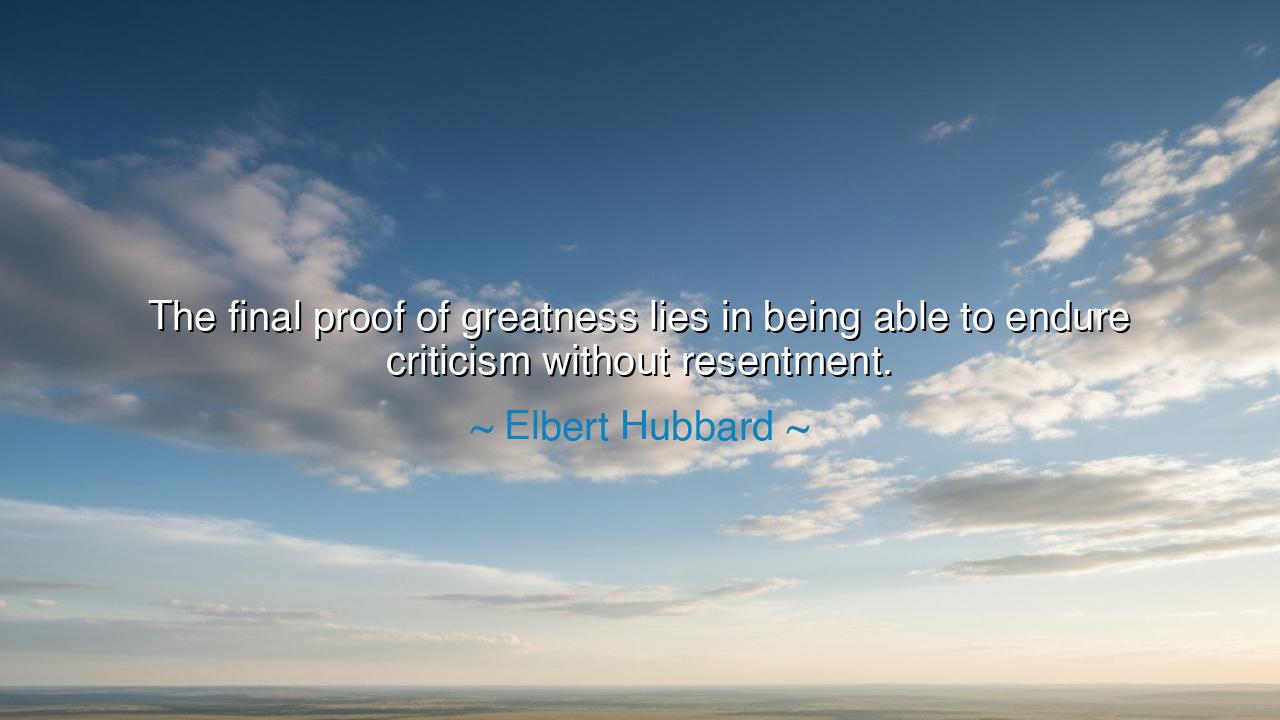
The final proof of greatness lies in being able to endure
The final proof of greatness lies in being able to endure criticism without resentment.






Hearken, O children of future generations, and heed the wisdom of Elbert Hubbard, who declared: “The final proof of greatness lies in being able to endure criticism without resentment.” In this simple yet profound truth lies the measure of a soul that has transcended pride and fear, a spirit tempered not merely by success, but by the calm resilience with which it receives judgment and opposition. True greatness is revealed not in applause, nor in power, but in the quiet mastery of self, in the ability to meet censure with dignity and equanimity.
From the earliest days of human reflection, sages and philosophers have observed that criticism is a crucible of character. The ancients knew that flattery inflates the ego but never tests the soul; it is the sting of reproach, the sharpness of disagreement, that reveals the strength of virtue and the depth of wisdom. Hubbard’s teaching illuminates this timeless truth: greatness is measured not by the absence of reproach, but by the capacity to endure it with calm and without bitterness, transforming opposition into understanding, rather than allowing it to fester into resentment.
Consider the life of Socrates, who faced relentless criticism, hostility, and ultimately the penalty of death for his pursuit of truth. Yet he bore his critics with patience, humility, and unwavering commitment to wisdom. In the face of accusation and misrepresentation, he did not retaliate with bitterness; he continued to teach, question, and inspire. Socrates’ endurance exemplifies Hubbard’s insight: it is the ability to endure judgment without resentment that cements greatness, not the acclaim of the multitude.
History offers yet another exemplar: Abraham Lincoln, who navigated the turbulent years of civil war and faced criticism from allies and adversaries alike. Letters, speeches, and public censure assailed him, yet he bore these with remarkable calm, reflecting deeply and acting with moral clarity. His greatness was not merely in leadership, but in the equanimity with which he received criticism, allowing him to remain focused on justice, unity, and the welfare of his people. Through this endurance, he demonstrated that strength is not the absence of challenge, but the ability to confront it without bitterness or loss of purpose.
Hubbard’s wisdom also speaks to the modern soul: in an age where judgment is swift, voices are many, and scrutiny is constant, the test of greatness lies in maintaining integrity and composure amidst censure. To respond with resentment is to surrender the higher self to the lower impulses of pride and fear. To endure without anger, to reflect without bitterness, and to act with virtue in spite of critique, is to embody the final proof of a character matured through trial and tempered by reflection.
From this reflection emerges a profound lesson: welcome criticism as a teacher, not as an enemy. Understand that censure reveals weaknesses, both real and perceived, and offers an opportunity to refine thought, action, and spirit. By enduring criticism without resentment, one demonstrates courage, humility, and mastery over the self—qualities far superior to any fleeting triumph won through flattery or fear.
Practical guidance flows naturally from Hubbard’s insight. Listen attentively when others challenge you, separate truth from opinion, and seek wisdom in their words. Respond not with anger, but with reflection. Cultivate the discipline to remain composed, to grow through critique, and to let resentment fall away like leaves from a tree. In doing so, you fortify your spirit and reveal the inner greatness that no external approval or disapproval can shake.
Thus, O children of generations yet unborn, let the words of Elbert Hubbard guide your hearts and deeds: the final proof of greatness lies in being able to endure criticism without resentment. Strive to cultivate patience, humility, and reflection, so that every word spoken against you becomes not a wound, but a forge in which your character is strengthened. In this mastery lies the enduring glory of the soul, the quiet triumph of virtue over ego, and the eternal proof of true greatness.
If you wish, I can also craft a more lyrical, audio-ready version with rhythm and cadence that rises and falls like an ancient epic, giving Hubbard’s wisdom a deeply evocative presence when spoken aloud. Do you want me to do that?






AAdministratorAdministrator
Welcome, honored guests. Please leave a comment, we will respond soon